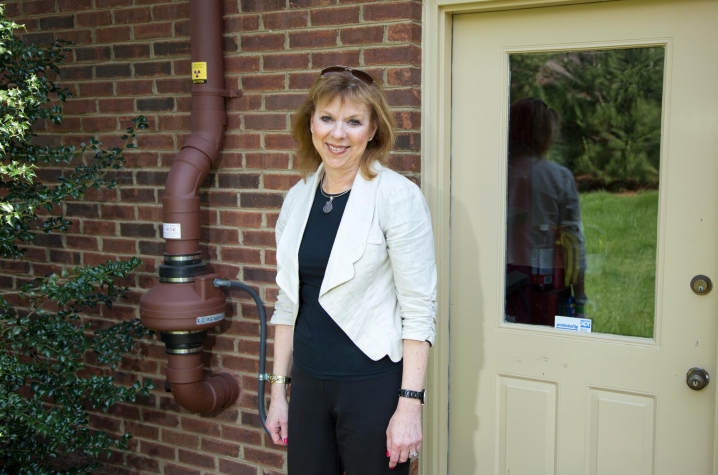Markey Patient Becomes Advocate for Radon Testing
LEXINGTON, Ky. (April 22, 2013) -- Lois Turner Dees of Lexington was always aware there was a gas called radon and she knew that the house she and her family lived in since 2000 was located in a high risk for radon area, but testing her home was never a top priority. That is, until December 2011 when she was diagnosed with adenocarcinoma, a form of lung cancer.
Eighty percent of lung cancers are non-small cell cancers, and of these, about 50 percent are adenocarcinomas. It is the type of lung cancer most commonly seen in women and is often seen in non-smokers. It starts in the edges of the lungs and can be present for a long time before it is detected.
Dees was shocked with a diagnosis of lung cancer. She was a non-smoker and wondered how this could be. Like many, she associated lung cancer with smoking cigarettes. Her doctor at the University of Kentucky Markey Cancer Center told her the main cause of lung cancer in non-smokers is radon and suggested she have her home tested.
The radon level tested in Dees’ home was 32 pCi/L (picoCuries per liter of air), which was eight times higher than the Environmental Protection Agency (EPA) recommended action level of 4.0 pCi/L. Since that time, Dees has had her home mitigated, a process in which a certified radon mitigation specialist installs a system which draws radon out of the home, reducing indoor radon exposure.
"Anyone can pick up a radon test kit for a reasonable cost at any home building supply store, or at the local health department for free," Dees said. "It's such a simple solution. Mitigation is somewhat costly, however, not nearly as expensive as chemotherapy."
Dees began her cancer journey with chemotherapy at Markey Cancer Center and went into remission between her fourth and fifth months of treatment. Then, two new tumors appeared. Her doctor said she could continue on with traditional treatment or look for a clinical trial. She enrolled in a clinical trial at Massachusetts General Hospital Cancer Center just a few months ago, where she is currently receiving treatment while continuing to undergo chemotherapy at Markey Cancer Center.
The radon level in her home did not affect just Dees. Her children are also at high risk for lung cancer due to radon exposure and her doctors have recommended that they get yearly chest x-rays.
"I understand that checking for radon levels is not a top priority for many people because it wasn't for me," Dees said. "Most of us are very conscientious about having smoke detectors and carbon monoxide detectors in our homes. Having a radon test is also vitally important, as I have learned the hard way. I encourage people to get a test kit and check the radon level in their homes. It's another thing you can do to save your life."
Radon is a cancer-causing, radioactive gas that you can't see, smell, or taste. It can get into any type of building - homes, apartment buildings, offices, and schools but people are most likely to get their greatest exposure at home, where they spend the most time. A home traps radon inside, where it can build up. Any home may have a radon problem including new and old homes, well-sealed and drafty homes, and homes with or without basements.
Kentucky is designated by the EPA as a Zone 1 region, which means it has a predicted average indoor radon screening level greater than 4 pCi/L(picocuries per liter), the EPA recommended radon action level. Kentucky has the highest lung cancer rates in the nation. In addition, if there is tobacco smoke and radon in your home, the chances of getting lung cancer increase almost 10-fold.
“There are no immediate symptoms that would alert you to radon. You must test to know it is present. Given radon is the second leading cause of lung cancer and high levels of radon exposure are common in Kentucky, it is extremely important to test your home for radon and to complete radon mitigation if exposure levels are high,” said Heather Robertson, program administrator for the Clean Indoor Air Partnership at UK’s College of Nursing and appointed by the Governor to the Kentucky Radon Program Advisory Committee.
Testing is the only way to know if you and your family are at risk from radon. For more information about radon, contact your local health department or the Kentucky State Radon Program at (502) 564-4856.
Media Contact: Ann Blackford at ann.blackford@uky.edu or 859-312-3587.






